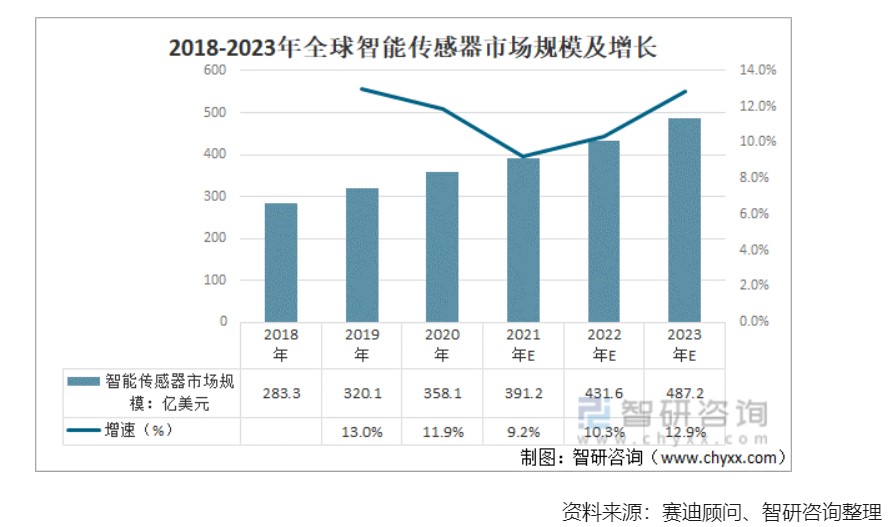After understanding the definition and development background of industrial smart sensors, global industrial smart sensor market analysis, enterprise layout and product introduction of industrial smart sensors, this article will mainly introduce the development prospects and suggestions of industrial smart sensors.
As an important part of the new infrastructure, the rapid development of the industrial Internet has brought huge development opportunities to industrial intelligent sensors, but also faces many challenges such as multi-scenario, low cost, low power consumption, safety and reliability. Therefore, industrial intelligent sensor and sensor system enterprises need to seize the opportunity, find the correct positioning, accelerate technological innovation, create an industrial ecology, and further contribute to the high-quality development of the industrial Internet.

Figure: Global smart sensor market size and growth from 2018 to 2023 (Source: Zhiyan Consulting)
Prospects for the development of industrial intelligent sensors
Miniaturization and nanotechnology: With the continuous advancement of microelectromechanical systems (MEMS) and nanotechnology, industrial smart sensors are developing in the direction of miniaturization and nanotechnology. This trend allows sensors to be more flexibly embedded in a wide range of industrial equipment, increasing the level of intelligence of the equipment while reducing the overall cost.
Intelligent: Sensors are becoming more intelligent, using internal processing units to perform some simple decisions and calculations, reducing dependence on external computing resources. The intelligent sensor can be automatically calibrated, automatically selected for range, automatically compensated, etc., which improves the accuracy and reliability of measurement.
Wireless and networking: With the advancement of wireless communication technology, wireless sensor networks have been widely developed. Wireless sensors can monitor and collect information about various industrial environments or monitored objects in real time, and transmit this information wirelessly to the data center for processing and analysis. This trend makes the deployment of sensors more flexible, reducing cabling costs while improving the real-time and reliability of data transmission.
Integration and multi-functionalization: Sensors are no longer limited to a single function, but are developing in the direction of integration and multi-functionality. By integrating multiple sensing elements and processing units, the sensor can measure multiple physical quantities at the same time, or in combination with other sensors, for more precise measurement and control.
Flexibility and wearability: Flexible sensors are an important direction for the development of sensors in the future. Flexible sensors can be as thin as a human hair, elastic, and can measure physical quantities such as temperature, pressure, and tension without contact. In the industrial field, flexible sensors can be applied to a wider range of scenarios, such as robot skin, flexible production lines, etc.

Figure: Development outlook for industrial smart sensors
Suggestions for the development of industrial intelligent sensors
With the rapid development of the Internet of Things, intelligent manufacturing and other fields, as well as the continuous progress and innovation of technology, the market demand for industrial intelligent sensors will continue to grow. It is expected that in the next few years, the scale of China's industrial intelligent sensor market will maintain a rapid growth trend. At the same time, with the continuous improvement of domestic sensor technology and the improvement of localization, the competitiveness of China's industrial intelligent sensors in the global market has also been continuously enhanced.
In addition, industrial intelligent sensors should also focus on the application market, seize the core products in key areas, focus on the core key products of intelligent manufacturing, smart life, automotive electronics, instrumentation, national security and other application industries, and accelerate the research and development and promotion of related products. By accelerating the product development of smart sensors made by mainstream technologies such as MEMS (microelectromechanical systems), CMOS (complementary metal oxide semiconductors), and spectroscopy, we will master core key technologies and form independent innovation capabilities.
Industrial intelligent sensors and sensing system enterprises need to have a global vision, should find their own positioning, aim at the development trend of the industrial Internet, identify the blue ocean market of the industrial intelligent sensor industry, purify the effective market, and achieve the final output value and profits.






